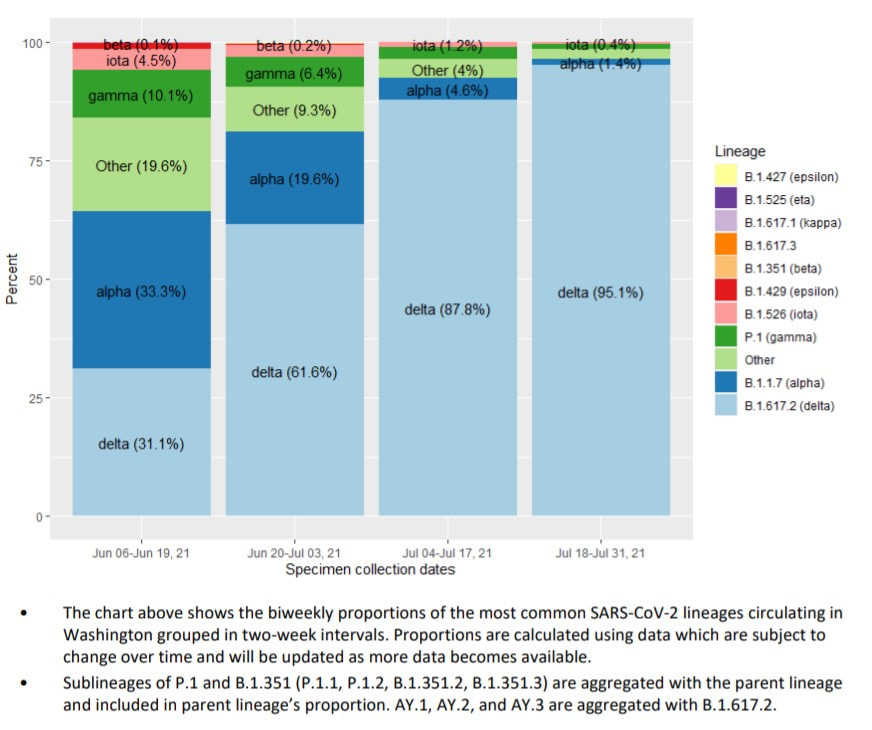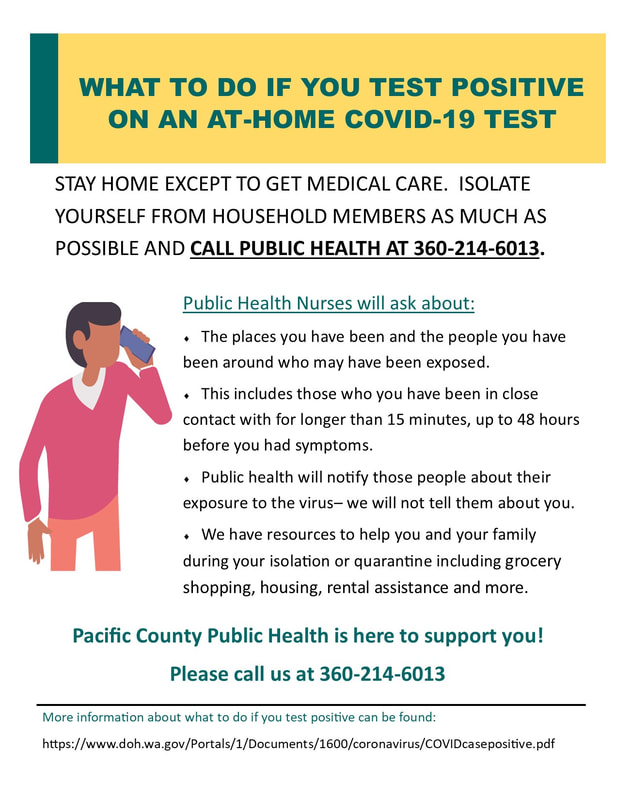|
We have heard many reports of people taking at-home rapid COVID-19 tests. We are so glad that people are being proactive and getting tested! If you have a positive result after taking an at home test result, we ask that you contact a public health at 360-214-6013. Our nurses will work to support you as you navigate your COVID-19 diagnosis, and provide education for you and people you know who may have been exposed. We also have care coordinators who can assist you with housing, food, or other needs you may have while you quarantine. Thank you and please share this post with others who may find it useful!
1 Comment
 We’ve received a lot of questions about how we determine whether a person who tests positive for COVID-19 has a variant of the virus. The COVID-19 test you’re given when you go to your doctor’s office or a drive-thru testing site detects the SARS-CoV-2 virus (the virus that causes COVID-19) but does not differentiate between different strains (or variants) of the virus. That’s why your provider may say they can’t test for variants. Determining whether a person is infected with a variant of the SARS-CoV-2 virus requires a process called genomic sequencing. That work is done at labs using the specimen collected to test for COVID-19. Genomic sequencing looks at the virus genes for mutations specific to the different variants. If a mutation is detected in a specimen, it means that person was infected with the corresponding variant. Not all specimens are sequenced – it’s just not feasible to sequence every specimen. But the state does sequence a representative sample of all confirmed cases from across the state. Because the sample is representative – meaning the cases in the sample group reflect the overall cases in the state – it can be used to estimate the prevalence of variants in the state. The most recent sampling estimates that 95.1% of all cases in Washington are likely attributable to the Delta variant. The state issues a report every Wednesday with data on variants in the state, including the number of cases in each county and the prevalence of variants based on the sequencing of the representative sample of cases. You can find that report here: https://www.doh.wa.gov/.../420-316... Gov. Jay Inslee today announced a vaccination requirement for employees working in K-12, most childcare and early learning, and higher education, as well as an expansion of the statewide mask mandate to all individuals while indoors, regardless of vaccination status.
The vaccination requirement will include -K -12 educators, staff, coaches, bus drivers, volunteers and others working in school facilities will have until Oct. 18 to be fully vaccinated as a condition of employment. This includes public, private and charter schools. This does not impact students, regardless of age. -Licensed, certified and contracted early learning and childcare programs -License-exempt early learning, childcare and youth-development programs -Contractors (coaches, volunteers, trainers) Everyone, regardless of vaccination status, will be required to wear face coverings in indoor public places beginning Monday, Aug. 23 Face coverings are strongly recommended (but not required) in crowded outdoor settings, like fairs, concerts and markets. The mask mandate will apply to nearly all public places, including: Restaurants, Grocery stores, shops, malls and public-facing offices, regardless of vaccination status. The mandate will include limited exceptions when face coverings won’t be required, such as office spaces not easily accessible to the public where individuals are vaccinated, and when working alone indoors or in a vehicle with no public face-to-face interaction. Small, private indoor gatherings where all attendees are vaccinated are also exempt from the mandate. Mask mandate: Gov. Inslee announced today that the existing statewide mask mandate that requires people who are not fully vaccinated to wear face coverings in indoor public places will be expanded to include people who are vaccinated. We will share more information as it becomes available. http://ow.ly/szkh50FTKKg While authorized vaccines have proven to be more than 90% effective in protecting against most variants, emerging data suggest people with moderately to severely compromised immune systems do not always build the same level of immunity compared to people who are not immunocompromised.
As a result, the FDA, CDC and Western States Scientific Safety Review Workgroup are recommending a third dose of mRNA (Pfizer and Moderna) vaccines to people who have: • Been receiving active cancer treatment for tumors or cancers of the blood • Received an organ transplant and are taking medicine to suppress the immune system • Received a stem cell transplant within the last 2 years or are taking medicine to suppress the immune system • Moderate or severe primary immunodeficiency (such as DiGeorge syndrome, Wiskott-Aldrich syndrome) • Advanced or untreated HIV infection • Active treatment with high-dose corticosteroids or other drugs that may suppress your immune response People should talk to their healthcare provider about their medical condition, and whether getting an additional dose is appropriate for them. At this time, no additional dose is recommended for people who had the Johnson & Johnson (Janssen) vaccine. There is not enough data at this time to determine whether immunocompromised people who received the J&J vaccine also have an improved antibody response following an additional dose of the same vaccine. People who received J&J should not get a second dose of either J&J or a dose of an mRNA vaccine. **Third doses are NOT currently being recommended for any other groups** Read more on the CDC website: here https://www.cdc.gov/.../vaccines/recommendations/immuno.htm A list of COVID-19 vaccine clinic options in Pacific County can be found at www.pacificcountycovid19.com or call 360-875-9407 if you need assistance signing up. |
|
